Japan's Typhoon Season 2025: Safety Tips for July Through October

Typhoons are a common natural event in the late summer and autumn in Japan. This article provides important safety advice for those visiting between July and October, along with tips on how to make the most of your trip regardless of the weather.
Japan's Typhoon Season: Tropical Storms Between July and October
If you are traveling in Japan between the late summer to the fall, you should be aware of typhoons, which are common during this time.
Typhoons can easily become natural disasters. If you hear that a typhoon is approaching, please plan to stay indoors when the winds get strong (up to 12 hours), because it is very dangerous to be outside.
Continue reading to learn more about Japan's typhoon season, what to do during a typhoon, and safety tips.
Typhoon Season in Japan
1. The Main Features of Typhoons in Japan
2. Can Typhoons Be Predicted?
3. Safety Tips During a Typhoon
4. Where to Find News on Typhoons
5. How to Pass the Time During a Typhoon in Japan
Read also
The Main Features of Typhoons in Japan
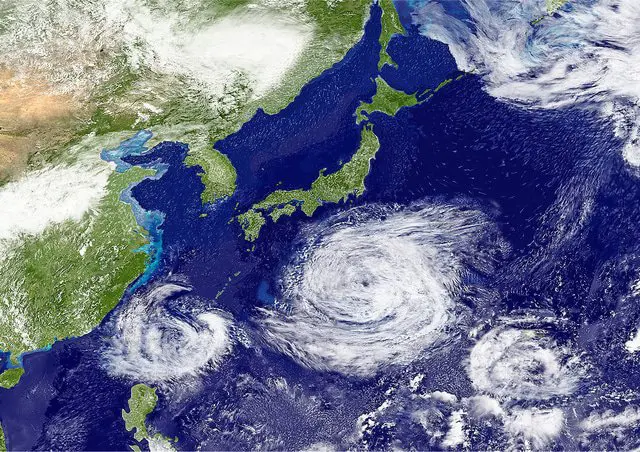
Photo by Pixta
Primarily occurring from July to October, typhoons are high-speed, uniform air vortexes that form over the oceans near Japan. These storms bring strong winds and heavy rains as they travel along their course. When a typhoon hits a region directly, the strong winds and heavy rainfall will continue for several hours, even up to half a day.
From about the 180-degree east longitude line over the east and north of the Atlantic Ocean, these powerful winds are called hurricanes, and from the Indian Ocean to the South Pacific, they are known as cyclones.
Yearly, there are an average of 26 typhoons. Around 11 of these draw close to Japan, and about three will hit inland. Most of the typhoons acting upon Japan particularly affect the southern, low latitudes of the country, traveling in a parabolic curb across the country.
There are typhoons that veer off towards the direction of the Philippines. However, these storms still leave their mark on Japan with heavy winds in the upper skies also causing problems across the region.
Source: The Japanese Meteorological Agency
Can Typhoons Be Predicted?
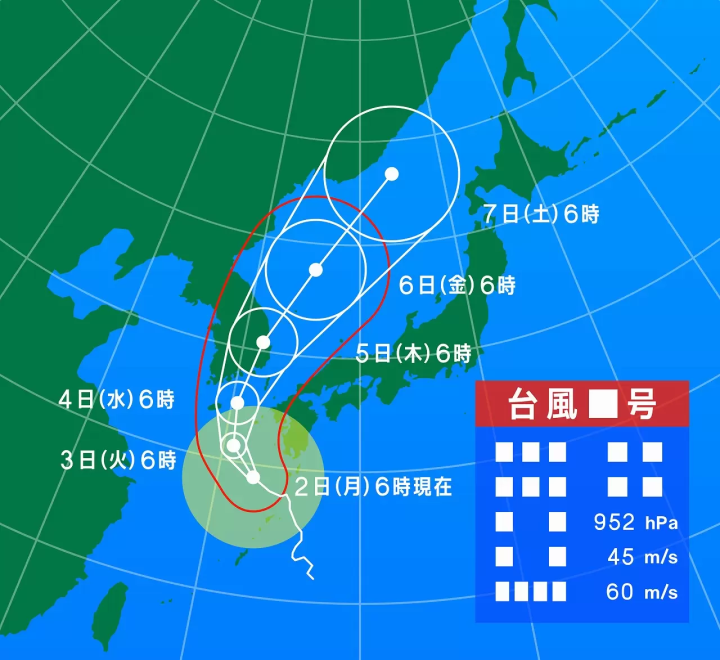
Photo by Pixta
Typhoons can be predicted to a certain extent. Meteorologists use various tools and techniques to forecast the development, path, and intensity of tropical cyclones, including typhoons. Some of the methods used for typhoon prediction include:
- Satellite Imagery: Satellites can track the formation and movement of tropical cyclones, providing valuable data for forecasting their paths.
- Computer Models: Meteorologists use numerical weather prediction models to simulate the behavior of typhoons. These models take into account various meteorological factors such as wind patterns, temperature, and pressure gradients to predict the path and intensity of the storm.
- Hurricane Hunter Aircraft: These aircraft fly into typhoons to gather data on temperature, humidity, wind speed, and direction. This data is crucial for improving the accuracy of typhoon forecasts.
- Historical Data and Trends: Meteorologists analyze historical data on typhoons and study trends to better understand how these storms behave and develop predictive models based on this knowledge.
While typhoon prediction has significantly improved over the years, there are limitations to how far in advance these storms can be predicted. Factors such as rapid intensification and sudden changes in steering currents can make forecasting challenging.
Despite these challenges, advances in technology and modeling have helped improve the accuracy of typhoon predictions, giving people in the path of these storms more time to prepare and take necessary precautions.
↑ Return to the top of article.
Safety Tips During a Typhoon
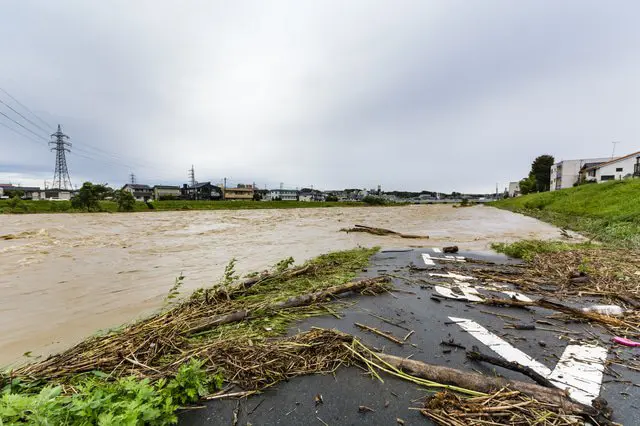
Photo by Pixta
If a typhoon is approaching, the two most important things to know are its strength and projected route. Please note that during typhoons, whether in the countryside or city, there is a high potential for heavy winds and rains that make even the sturdiest of umbrellas collapse. Moreover, there is the risk for glass windows to be blown away, trees, boards, and other objects to fall in the streets.
Due to this, is strongly recommended to stay inside. Below are some other points to keep in mind.
1. Trains and flights will be delayed and there is a high potential for flights to be canceled during a typhoon. If you hear that a typhoon is approaching, please check the latest information regarding your flight.
2. Shopping centers and sightseeing spots may have their hours shortened or can be temporarily closed during typhoons. Please stay at your hotel, at home, or in another safe place until the typhoon passes.
3. Do not go near mountains or bodies of water as there is an incredibly high risk of floods, high waves, and landslides.
4. Roof tiles, signboards, and other materials may be blown away by strong winds, so please stay indoors.
5. Power outages may occur more frequently during typhoons, so it is a good idea to keep cell phones and smart devices charged when not in use.
Typhoons are powerful and may have long-reaching effects until they have fully passed. Even though you may think it's safe, that may not necessarily be true. It may have moved on from where you are currently, but it is a very good idea to keep an eye on the weather and the situation around you just in case.
↑ Return to the top of article.
Where to Find News on Typhoons
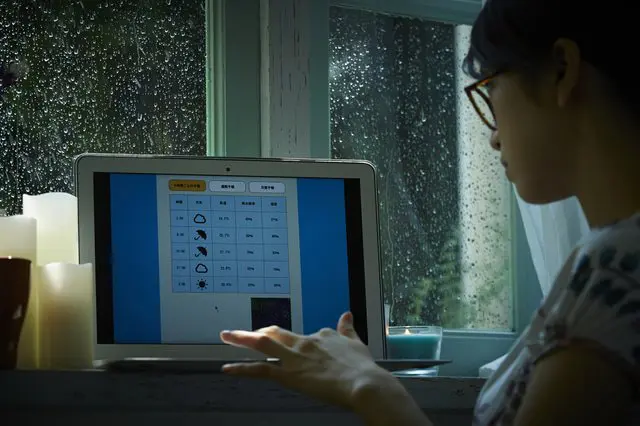
Photo by Pixta
If a typhoon forms, from Japan or over distant parts of the seas, the potential path of the typhoon will be plotted and shown over the TV and radio on major news networks. Before departing for Japan and during your stay here, it is a good idea to keep an eye on the weather forecasts being broadcast.
Incidentally, while they are given names much like hurricanes overseas, in Japan typhoons are referred to by number; the first typhoon of the season being Typhoon Number 1, the second Typhoon Number 2, and so on.
They are also divided based on their strength (strong, extremely strong, violent) and size (large, extremely large), which is then applied to their description: extremely large, very powerful typhoon number 5, for example.
If you are not confident in your Japanese abilities, please refer to the English version of the Japanese Meteorological Agency website for more information and real-time weather updates.
↑ Return to the top of article.
How to Pass the Time During a Typhoon in Japan

Photo by Pixta
During small and weak typhoons, most weather-protected sightseeing spots, indoor shopping centers, and amusement/entertainment facilities will remain open and you can pass the time inside. In fact, due to the poor weather conditions, you may find spots normally filled with people considerably less crowded.
However, facilities may shorten their hours or close suddenly, so please keep the conditions and availability of transportation in mind.
When a large, powerful typhoon is on its way, it's best to stay indoors at your hotel. It's also a good idea to have some books or magazines, extra food or snacks, and drinks on hand.
Check if your hotel has any DVDs or games that guests may borrow, and wait out the typhoon in the comfort of your room!
Read also
All pictures from PIXTA
旅行が趣味の22歳です。日本の魅力をお届けします。



































![[During Your Kumano Trip] Dorokyo Meguri no Sato Kumano River](https://resources.matcha-jp.com/resize/720x2000/2025/11/05-249123.jpeg)
![[Kagoshima] Enjoy Minamisatsuma City to the Fullest! A Guide to the Scenic Beauty and Culture of Five Areas](https://resources.matcha-jp.com/resize/720x2000/2026/02/15-258755.webp)
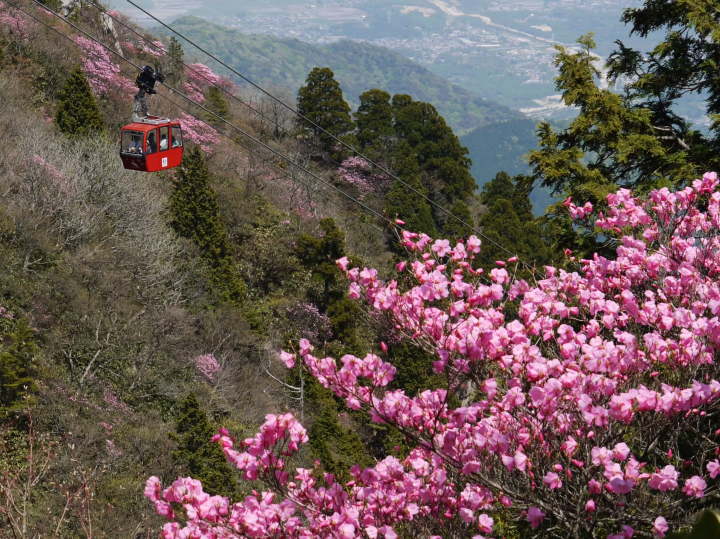
![[Yufuin]Yufuin in 100 Minutes: Quick Access Guide](https://resources.matcha-jp.com/resize/720x2000/2026/02/15-258738.webp)
![[Shinjuku Nishiguchi HALC] About the d Point Campaign](https://resources.matcha-jp.com/resize/720x2000/2026/02/14-258714.webp)